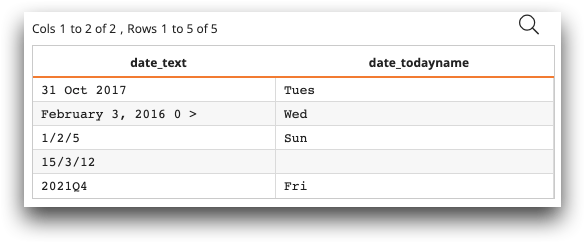todayname(X;Y)
Convert a string, date+time, or date to the conventional name for the day of the week. (Available as of version 18.03)
Syntax
todayname(X;Y)Input
| Argument | Type | Description |
|---|---|---|
X |
any | A scalar value or the name of a column containing date-related values Valid values can be of the form:
|
Y |
text | An optional argument specifying which date mode to use if the date has an
ambiguous format. For example, the string "1/2/3" can be interpreted as January 2,
2003 (using month/day/year format), or it can be interpreted as February 3, 2001
(using year/month/day format). Valid values are:
The default value is You can add the
argument Use the following
options to shorten the day of the week names:
By default, the initial letter of returned day names is capitalized (in
English and German) or not (in French, Spanish, and Hungarian). To change the
default, use the following options:
You can also add an optional argument to tell Valid values are:
|
todayname(X;Y) can take a variety of input values and uses internal logic
to parse the dates. For example, the function assumes that a 4-digit number represents a
year, and that a month name or abbreviation (such as "Jan") is obviously a month. Any
ambiguities are resolved using the setting of the Y argument.
Return Value
Returns an integer value corresponding to the day of the week. If X
contains a time stamp, it is discarded.
If the input is invalid and the Y argument includes
'invalidna', the function returns a null value. If the input is invalid
and the Y argument includes 'invaliderr', the function
throws an error. In this way, todayname(X;Y) provides date validation if
the input value is already in a date or date+time
format.
For more information about date formats, see Dates and time.
Example
The following example converts strings containing dates in various formats to a day of the
week name. The Y argument is 'mdymode', so that any
ambiguous dates are parsed as month/day/year.
<table cols="date_text"> "31 Oct 2017" "February 3, 2016 04:45:01" "1/2/5" "15/3/12" "2021Q4" </table> <willbe name="date_todayname" value="todayname(date_text; 'shortish' 'mdymode' 'allowyqm')"/>

The first date, 31 Oct 2017, is parsed correctly because there
is no ambiguity about "Oct" being the month and 31 being the day. The second date,
February 3, 2016 04:45:01, is parsed after dropping the time
stamp. The third date, 1/2/5, is ambiguous, so the
Y argument tells todayname to parse the date as
month/day/year, or 01/02/2005.
15/3/12, cannot be parsed as month/day/year because it is not
a valid date, and returns a null value. 2021Q4 is converted to
Fri (October 1, the beginning of Q4, occurs on a Friday),
because we used the 'allowyqm' option.
